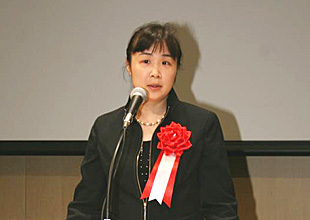 The Winner of the Ninth Asia Pacific Research Prize (Iue Prize) : Dr. YI Ping
The Winner of the Ninth Asia Pacific Research Prize (Iue Prize) : Dr. YI Ping
Title of Dissertation : Between War and Peace - The "Just War" concept and its consequences during the early period of international law research in Japan

- Dr. YI Ping
-
- Career -
YI Ping, Instructor at Peking University Law School, is a specialist in fundamental theories of international law. After graduating from Peking University Law School with an LL. B. and an LL. M. in 2000 and 2003, respectively, she obtained another LL. M. degree and an LL. D. degree at the University of Tokyo Graduate Schools for Law and Politics in 2006 and 2009, respectively. A graduate student at Peking University Law School, she spent 1 year in Japan from 2001 to 2002 as an exchange student at the Faculty of Law, Niigata University. Then for her continued study in Japan she also received scholarships from Mizuho International Foundation (from 2004 to 2006) and Dr. Adachi Mineichiro Memorial Hall (from 2006 to 2007). And then she served as a research fellow (DC2) at the Japan Society for the Promotion of Science from 2007 to 2009.
- Summary -
- Between War and Peace
- The "Just War" concept and its consequences during the early period of international law research in Japan -
Focused on the concept of "Just War", and based on the analysis of the opinions of some famous international lawyers in the early period of international law research in Japan, the dissertation examined the war concept at that time from both theoretical and practical perspectives. At the theoretical level, there were some different types of theories where the element of approving war and the element of denying or restricting war coexisted, though carrying different weights. however, such differences among theories disappeared at once when they were used to instruct, interpret, and, in particular, to justify the practice like the Russo-Japanese War. At that moment, all types of international law theories came to coincide with each other, and the boundary between them became vague.
What's the reason for that phenomenon? Yi Ping argues that, although there is always a concept of "Just War" as a sort of conscience of restricting war in theories of international law, there are also dangerous pitfalls in the theoretical structures. And when these theories were applied to practice, the conscience of restricting war either became invisible or was deformed, and the dangerous pitfalls came true.
Actually, even today when the principle of "refraining from the threat or use of force" has obtained an unshakable position in international law, we should not stop thinking about the legal characters and legal effects of war. The very nature of war and peace must be questioned constantly in the context of the complicated relationship between law and power, justice and force, and abstract concepts and concrete realities. By analyzing the reason why these early international law scholars' theories got deformed (or were deformed), we could obtain some significant lessons or positive inspirations. Examined retrospectively, history would be more than heavy burden and it could become treasure for future.






